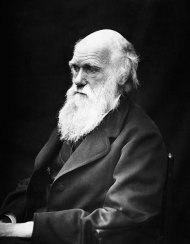 Ewen Callaway, online reporter
Ewen Callaway, online reporter
While traveling around the world aboard the HMS Beagle, Darwin was struck by the fact that he could understand facial expressions of people from different cultures, but not their languages or gestures. Darwin also believed that our sense of moral compassion came from a natural desire to alleviate the suffering of others. He was an ardent abolitionist.
Paul Ekman, a psychologist at the University of California, San Francisco, who has authored an introduction to Expressions of the Emotions, said today at a AAAS press conference that these views are nearly identical to those of Tibetan Buddhists.
"I am now calling myself a Darwinian, " Ekman recalled the Dalai Lama saying, after Ekman read him some passages of Darwin's work.
Ekman said he spent two full days in deep conversation with the Dalai Lama, resulting in a treatise of his own. He argues through several lines of evidence that Darwin's views on emotion and compassion were inspired directly by Tibetan Buddhism.
"There's always the possibility that two wise people looking at the same species for long enough are going to come to the same conclusion, " he said. Ekman thinks otherwise.
He bristled at requests to elaborate more on his ideas until his talk later today. I'll try to attend that session and provide an update.
But Ekman did make one thing clear: "I'm not saying that Darwin was a Buddhist." Rather, he took intellectual inspiration in some aspects of the religion.





